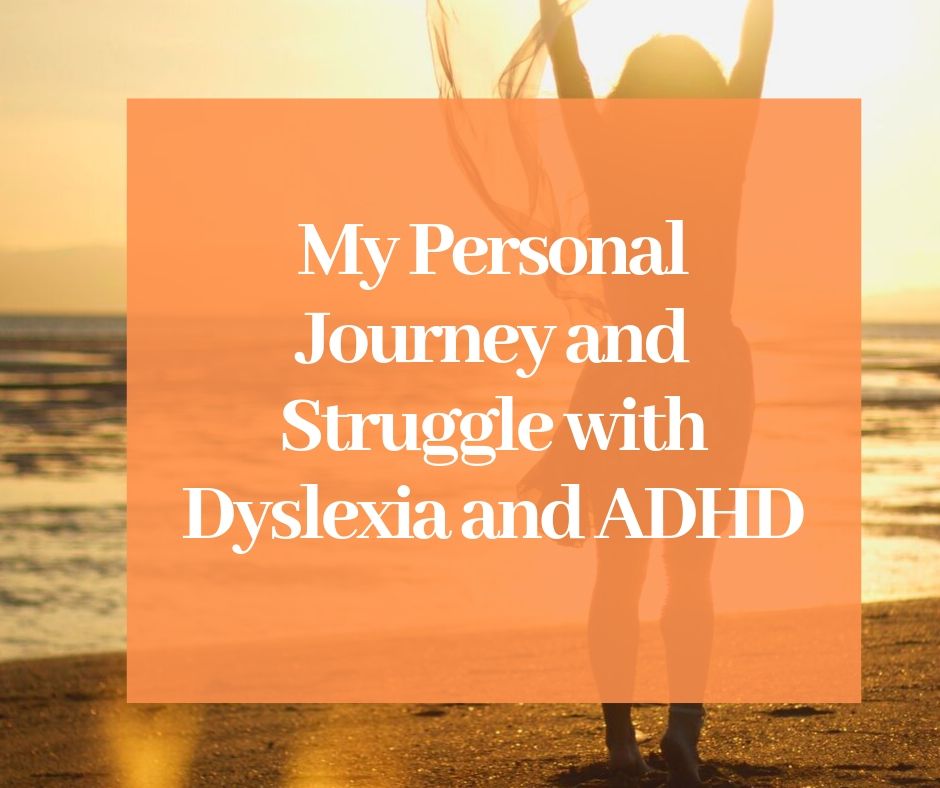By: Zahavit Paz
Table of Contents
ToggleOctober is Dyslexia Awareness Month History of Dyslexia
My hope is that sharing my story will encourage and bring hope to those who struggle with the dual diagnosis of dyslexia that often overlaps with ADHD.
Often, as with my experience having initially disorder ADHD diagnosis, the possibility that I had a dual diagnosis to include dyslexia was not considered. Nearly 50% of people with ADHD also have a learning disability of dyslexia connections between dyslexia and ADHD.
At any age, if you experience any signs and symptoms of dyslexia and/or ADHD it’s important for you to get diagnosed.
Additional Dyslexia and ADHD Resources:
A diagnosis will help you attention problems understand the impact the symptoms have had on your life and direct you to treatment and resources to manage the symptoms. Growing up with dyslexia & ADHD hadn’t been easy for me. I am just like you and many others who suffer from Dyslexia & ADHD, living with a dual diagnosis.
Getting started with a self-assessment of LD
Review and reconstruct your psycho-social, child development, and early learning history. Obtain your medical history along with your doctor’s observations. Once you have collected this information discuss your symptoms with your primary care doctor and ask for a recommendation of professionals and a Neuropsychologist for you to obtain testing and an assessment for dyslexia.
A Need To Improve Language Skills
For me, the turning point in my life began at the age of forty, when I decided to go back to university after a successful business career. I felt I wanted to complete my education and, financially, I was at the point where I could take time off to work on my own self-improvement and get a higher education, which I always wanted to do, but just hadn’t had the opportunity.
I also knew that I no longer could manage in the business world without having manageable language skills. The world was changing. The computer revolution made greater demands on the small businessperson/employee with e-mailing, requiring a prompt direct written response to an inquiry or request. No longer was correspondence supported by a secretary.
I had always felt unsatisfied with my poor language skills, reading, and writing which limited me to choosing work not requiring those skills.
In the spring of 1996, I enrolled in a course on public speaking at NYU to improve my skills in this area, as I had been recently elected chairperson of the America Israel Cultural Foundation.
The Importance of Finding the Right Teacher
At NYU, Dr. Betty Horowitz taught public speaking in the evening and during the day she worked at Boces Agency, in Westchester County, as a speech pathologist (Boces: Board of Cooperative Educational Service). This agency was established for children with special needs, with a spectrum of behavioral, learning and emotional problems. It was a fortunate coincidence for me to meet her.
My direct approach, which I inherited from my grandma Miram, and Dr. Horowitz’s experience in the field, led her to believe that I have dyslexia. I also told her “I think I suffer from dyslexia, though I have never been diagnosed“ and ”writing assignments for your course will be difficult for me”.
She immediately recognized my vision problems and encouraged me to have my eyes examined by a specialist. My answer was “I just had my eyes examined by an optometrist for reading glasses and I even asked him to check my eyes for dyslexia”. He said he did not detect a problem.
All along, I knew there was something wrong that caused my poor language skills. The most difficult step for anyone is to finally admit they have a problem that sets them apart from most people. In the beginning, I didn’t want to admit this. Dr.Horowitz was the first person who showed me that she cared.
Every time I came to class, she asked if I had made an appointment with the eye specialist. Finally, my answer was yes. The doctor she recommended was good, despite his office being in Westchester, somewhat of a distance from where I live. Nevertheless, I went to his office until I found another doctor in Manhattan.
The Role of Genetics and Family History in ADHD
Dr. Horowitz said the first step was to discover my particular difficulties and identify them. She was trying to discover the answer to my puzzle by putting all the pieces together. The process of identifying these pieces requires work and can create some emotional discomfort. My mother became defensive when I questioned her about my childhood development and birth.
Parents often feel they didn’t give their children with dyslexia and children with ADHD (attention deficit hyperactivity disorder) the help they needed. Given that dyslexic children and ADHD have a hereditary component, they may feel responsible for passing down their unhealthy genes and somehow blame themselves for these conditions.
In my case, my mother said that she was left-handed and was forced by the nuns at school to become right-handed. In those days, being left-handed was unacceptable and it caused her some difficulties with language.
Later on, she enjoyed a successful career as a couture designer. My dad passed away since then but he had ADHD behavior and there is a high probability he was dyslexic. He was a very talented man who never finished high school but could figure out complicated projects in construction that famous architects gave up trying to solve.
That was his specialty. One of his hobbies was to take a complicated machine and alter it to make it perform at a higher level or convert it to be used with other construction materials that no one thought was possible. He was an excellent engineer without ever having studied engineering. People would come to consult with him from all over the country and asked to borrow his crazy innovative machines.
How I Identified My Learning Disability & ADHD Symptoms
Dr. Betty Horowitz explained that I needed to “crack open the shell” and find the core of the problem, in order to alleviate it. I started to imagine my brain, after this conversation, as if it were a walnut, which actually looks a bit like a brain. This simple visualization was a useful tool for me to understand the need to uncover layers in order to get to the core.
The brain is like an orchestra and timing plays a very important role. If things don’t work in synchrony, and if they are out of tune, they don’t match the rest of the orchestra. As an adult, you have to uncover most of your symptoms by yourself and bring them to the attention of your therapist… after all, you know your body better than any therapist.
Adult Dyslexia & ADHD Diagnosis and Treatment
I started to make lists, words I had difficulty pronouncing and I constantly misspelled. Words I frequently mispronounced or mixed up as they sound alike. I took a T.O.V.A test and was diagnosed with ADHD in October 1997. Until then, I hadn’t been diagnosed, for some reason.
Although I was treated with Neurofeedback for ADHD and, later on, tested by the same therapist, it was never suggested that I take a test for dyslexia.
It’s very important to be diagnosed. The catalyst for getting diagnosed was when I needed documentation for NYU, in order to be eligible to receive accommodations as learning disabled. You can find out more information on the ADA website
Although I had other tests results, I needed a specific test in accordance with the college’s testing guidelines.
Dr. Horowitz and I came to the conclusion that my dyslexia/ADHD symptoms were evident in my poor handwriting, reading, way of decoding sounds of speech, spelling, and attention deficits. It was frustrating to accept that I had several symptoms and I was told by Dr. Horowitz that they are a “crazy maker” and not easily remedied.
Facing the Challenges of Dyslexia and ADHD
I was disappointed to find out that not only did I have a combination of disabilities but that I had also not been given much hope. I swallowed that news, but in truth, it made me even more determined to overcome my LD. I knew this was my only chance to have a better life.
It became my mission to educate myself about my symptoms to help me in finding solutions. I found that Dyslexia and Attention deficit are very different. Dyslexia is a language communication disability and ADHD is primarily a problem in focusing. Today, there are many different theories of what dyslexia and attention deficit are and what causes them.
Adult dyslexia & ADHD and Inner-ear Balance deficit connection
Some research supports a link of Inner Ear Deficits people with dyslexia and Hyperactivity due to the location of the same processors in the brain impacting balance and orientation. Considering this hypothesis
Dr. Horowitz referred me to a hearing test at St. John’s University’s Speech and Hearing Center specialists in LD speech-language disorders.
The test results showed the possibility of Meniere disease that affects the inner ear and causes a balance disorder. I went to physical therapy and was helped with balance exercises.
Subsequent neurological testing by a Dr.Harold Levison, a prominent psychiatrist specialist in ADHD and Dyslexia at his office revealed balance issues, an inner ear vestibular dysfunction.
Often when I read, words and sentences are blurred and I noticed my reading improves while using blue colored lenses or colored overlays recommended by a vision therapist Vision Therapy and are now available My Personal Journey at low cost.
Conquer Your Dyslexia Through the Use of Assistive Technology
Understanding my own disability was key to taking control of my Dyslexia and ADHD. With the help of the latest technological advancements and assistive technology, I was able to take charge of my life.
By using different assistive technology tools I overcame many of the challenges I faced daily. Note-taking for my poor handwriting by dictating using speech to text. For reading, I use e-readers and to help me with my grammar, free software Grammarly. There are many types of dyslexia tools that are available for people who have been diagnosed with dyslexia and there are many more that are being developed.
KEYS FOR SUCCESS When Dealing With Dyslexia and ADHD
The most important thing is to identify your symptoms, obtain a diagnosis, develop skills to overcome and remediate the symptoms.
For me, assistive technology tools changed my life!
Know your rights and develop self-advocacy skills
Develop organizational skills to improve your confidence and self-awareness, and create a path to success in your chosen career.
Your teachers, professors, parents and the love of good friends can offer lots of support!
I like to applaud those visionary educators and individuals that provide support for students with Learning Disabilities and those that have empowered me to establish LDRFA ( LD Resources Foundation)
Through our website www.ldrfa.org we’ve been able to help support hundreds of LD students and adults and get them the resources they need to succeed in their educational journey and ultimately career goals.
Remember you’re not alone. Read about other famous people with Learning Disabilities, Dyslexia & ADHD and their journey to achieve success and overcoming the challenges with dyslexic readers.
If you have a personal story of your struggle and learning disability you want to share and help others, let us know. We love to feature your journey on our website.



